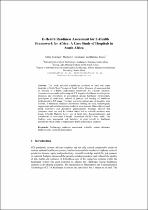 ResearchSpace
ResearchSpace
E-health readiness assessment for e-health framework for Africa: a case study of hospitals in South Africa
JavaScript is disabled for your browser. Some features of this site may not work without it.
- ResearchSpace
- →
- Research Publications/Outputs
- →
- Conference Publications
- →
- View Item
| dc.contributor.author |
Coleman, A

|
|
| dc.contributor.author |
Herselman, Martha E

|
|
| dc.contributor.author |
Potass, D

|
|
| dc.date.accessioned | 2012-06-25T13:39:31Z | |
| dc.date.available | 2012-06-25T13:39:31Z | |
| dc.date.issued | 2011-11 | |
| dc.identifier.citation | Coleman, A, Herselman, ME and Potass, D. E-health readiness assessment for e-health framework for Africa: a case study of hospitals in South Africa. 4th ICST International Conference on eHealth, Malaga, Spain, 21-23 November 2011, pp 162-169 | en_US |
| dc.identifier.isbn | 978-3-642-29261-3 | |
| dc.identifier.isbn | 978-3-642-29262-0 | |
| dc.identifier.uri | http://www.springerlink.com/content/r8w9422801074270/?MUD=MP | |
| dc.identifier.uri | http://hdl.handle.net/10204/5939 | |
| dc.description | Copyright: 2012 Institute for Computer Sciences, Social Informatics and Telecommunications Engineering. | en_US |
| dc.description.abstract | This study assessed e-healthcare readiness of rural and urban hospitals in North West Province of South Africa. Outcome of assessment led to creation of e-health architectural framework for e-health solutions. Assessment was conducted in usage of ICT in patient healthcare record system, processes and procedures in consultation among healthcare professionals, prescription of medication, referral of patients and training of healthcare professionals in ICT usage. The study was in two phases and six hospitals were selected. E-healthcare readiness assessment focusing on need, technological, engagement and social acceptance readiness were assessed. Data collected used group interviews and qualitative questionnaires. Findings showed that computers were not used for clinical duties and no e-health solutions were found. E-health Maturity Level was at level zero. Recommendations and compilation of Provincial E-Health Framework (PEHF) were made. The findings were unexpected and therefore, of great benefit to healthcare institutions which intend to implement e-health initiatives in hospitals. | en_US |
| dc.language.iso | en | en_US |
| dc.publisher | Springer | en_US |
| dc.relation.ispartofseries | Workflow;8018 | |
| dc.subject | E-health | en_US |
| dc.subject | E-health solutions | en_US |
| dc.subject | North West Privince hospitals | en_US |
| dc.subject | Healthcare record system | en_US |
| dc.title | E-health readiness assessment for e-health framework for Africa: a case study of hospitals in South Africa | en_US |
| dc.type | Conference Presentation | en_US |
| dc.identifier.apacitation | Coleman, A., Herselman, M. E., & Potass, D. (2011). E-health readiness assessment for e-health framework for Africa: a case study of hospitals in South Africa. Springer. http://hdl.handle.net/10204/5939 | en_ZA |
| dc.identifier.chicagocitation | Coleman, A, Martha E Herselman, and D Potass. "E-health readiness assessment for e-health framework for Africa: a case study of hospitals in South Africa." (2011): http://hdl.handle.net/10204/5939 | en_ZA |
| dc.identifier.vancouvercitation | Coleman A, Herselman ME, Potass D, E-health readiness assessment for e-health framework for Africa: a case study of hospitals in South Africa; Springer; 2011. http://hdl.handle.net/10204/5939 . | en_ZA |
| dc.identifier.ris | TY - Conference Presentation AU - Coleman, A AU - Herselman, Martha E AU - Potass, D AB - This study assessed e-healthcare readiness of rural and urban hospitals in North West Province of South Africa. Outcome of assessment led to creation of e-health architectural framework for e-health solutions. Assessment was conducted in usage of ICT in patient healthcare record system, processes and procedures in consultation among healthcare professionals, prescription of medication, referral of patients and training of healthcare professionals in ICT usage. The study was in two phases and six hospitals were selected. E-healthcare readiness assessment focusing on need, technological, engagement and social acceptance readiness were assessed. Data collected used group interviews and qualitative questionnaires. Findings showed that computers were not used for clinical duties and no e-health solutions were found. E-health Maturity Level was at level zero. Recommendations and compilation of Provincial E-Health Framework (PEHF) were made. The findings were unexpected and therefore, of great benefit to healthcare institutions which intend to implement e-health initiatives in hospitals. DA - 2011-11 DB - ResearchSpace DP - CSIR KW - E-health KW - E-health solutions KW - North West Privince hospitals KW - Healthcare record system LK - https://researchspace.csir.co.za PY - 2011 SM - 978-3-642-29261-3 SM - 978-3-642-29262-0 T1 - E-health readiness assessment for e-health framework for Africa: a case study of hospitals in South Africa TI - E-health readiness assessment for e-health framework for Africa: a case study of hospitals in South Africa UR - http://hdl.handle.net/10204/5939 ER - | en_ZA |





